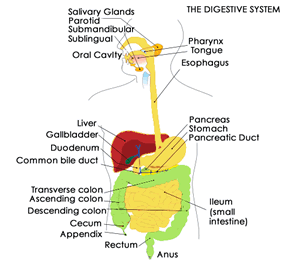Alcohol’s Effect on the Digestive Tract
Alcohol is not digested like other food. It is almost a poison in the body, negatively affecting anything it “touches.” Your mouth is the entrance to your digestive tract, and alcohol has been shown to damage every part of it. Chronic alcohol use leads to detrimental consequences in the digestive tract.
Alcohol’s Effect on the Digestive Tract: What is the digestive tract?
Before you can understand alcohol’s effect on the digestive tract, you have to understand what the digestive tract is and what its functions are. The digestive tract is considered to be a continuous tube extending from the mouth to the anus. It is divided into different segments: oral cavity, pharynx, esophagus, stomach, small intestine, large intestine, rectum and anal canal. The job of the digestive tract is to chemically break down the food that you eat. It allows you to absorb nutrients and eliminate waste.
The digestive tract is the site of alcohol absorption into the blood stream. When alcohol comes into direct contact with the mucous membrane that lines the digestive tract, it can cause many metabolic and functional changes.
Alcohol’s Effect on the Digestive Tract: Oral Cavity and Esophagus
Chronic alcohol abuse can cause damage to the salivary glands, which interferes with saliva secretion. Alcohol can also cause inflammation of the tongue and mouth, increased incidence of tooth decay and gum disease, and impaired movement of the esophagus.
Alcohol’s Effect on the Digestive Tract: Stomach
Even moderate drinking can cause changes in gastric acid secretion. Gastric acid secretion is secretion of hydrochloric acid and enzymes into the stomach to begin protein digestion. In low doses, alcohol stimulates gastric acid secretion. In higher doses, it causes inhibition in gastric acid secretions. When gastric acid secretions are inhibited, the stomach has less ability to kill bacteria that enter the body with food. This may lead to the colonization of the upper small intestine with harmful organisms.
Chronic alcohol consumption can also cause gastric mucosal injury. Alcohol’s effect on the digestive tract is that it can cause bleeding gastric lesions that can destroy part of the mucosa.
Alcohol’s effect on the digestive tract includes interfering with gastric and intestinal motility. It causes damage to the stomach muscles that are responsible for mixing food and gastric fluids. This changes how long it takes food to go through the digestive tract and delay emptying of the stomach. This can cause production of gas.
Alcohol’s Effect on the Digestive Tract: Small Intestine
The small intestine is where most nutrients are absorbed. Alcohol interferes with absorption of these nutrients. It also can interfere with enzymes needed for digestion and to metabolize drugs. Alcohol can also cause erosions and bleeding in the mucosa.
Alcohol’s Effect on the Digestive Tract: Large Intestine
Alcohol consumption significantly reduces the frequency and strength of the muscle contractions in the segment of the rectum. This can reduce transit time of intestinal contents and contribute to the diarrhea that is frequently observed in alcoholics.
Source:
http://www.montana.edu/wwwai/imsd/alcohol/Vanessa/vwgitract.htm


